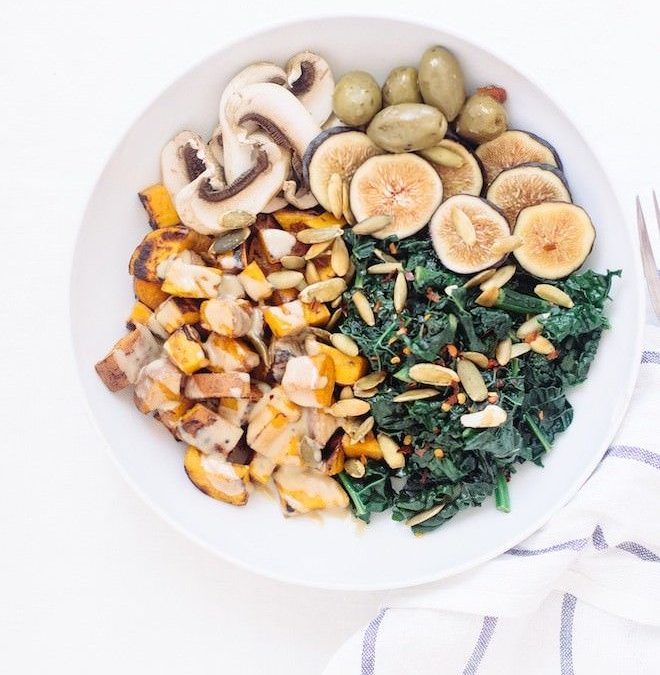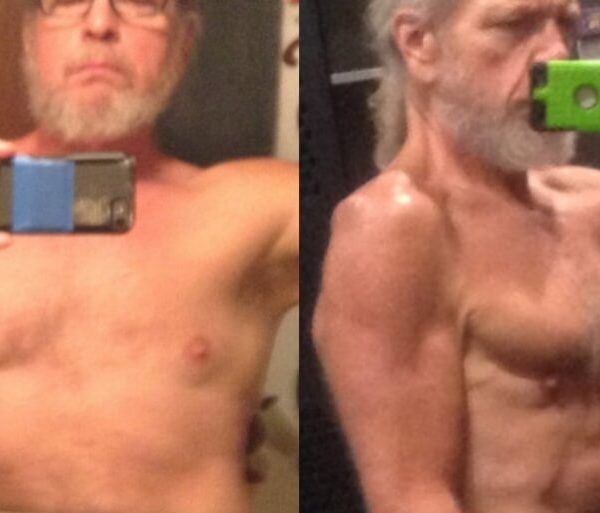How to Start and Stick To a Diet
Learning how to start a diet is tough, but learning how to stick to a diet is even tougher.
Diet motivation is easy to come by in the first few weeks—your weight plummets, hunger rarely rears its head, and you wonder why you didn’t start earlier. After a month or so, though, weight loss comes in fits and starts, motivation skids, and you begin to wonder why you can’t seem to lose weight despite eating the same amounts of the same foods. Sadly, this is when most people throw in their hand.
It doesn’t have to be this way, though.
Below are 10 strategies that will make sticking to your diet a cinch.
If you want to know once and for all how to start a diet and stick to it, this is the article for you.
1. Remember Your Why
When you’re tempted to deviate from your diet or exercise plan, reminding yourself why you want to lose weight is a powerful guardrail for keeping you on track.
The real magic comes, however, when you take your “why” and vividly imagine a future event that’s linked to your goal—a strategy scientists call episodic future thinking.
For example, let’s say your wedding is on the horizon, and you want to make sure you fit nicely into your dress or suit for the big day. Every time you’re tempted to renege on your diet, take a second to remind yourself why you want to lose weight and imagine things such as:
- Where you’ll be on your wedding day.
- How happy you’ll be to see your closest friends and family.
- How pleased you’ll be with the event, including the room decorations, the entire wedding party, and your dress or suit.
- How satisfied you’ll be for sticking to your diet and exercise plan, and how confident you’ll feel standing in front of all those people.
- How comfortable you’ll feel having your picture taken, knowing you achieved the body you wanted.
Do this for as long as it takes to feel that day—taste the flavours and smell the smells—and research shows your lucid vision of success can outshine the lustre of immediate gratification.
If you want to learn more about how episodic future thinking can help you stick to your diet, check out this article:
Use This Simple Mind Trick to Instantly Boost Your Motivation
2. Avoid “Shiny Object Syndrome”
Most people are excited to start a new, trendy diet, especially when it’s been billed in the media as the answer to all your weight-loss woes. Whether it’s the keto or carnivore diet or some nonsense cooked up by a doctor or pro sportsballer, the idea of a new, better diet draws people in like a butterfly to a waste bin.
And when you’re enthusiastic about it, it’s easy to stay motivated.
After a few weeks of dieting, however, diet motivation tends to wane—particularly if you encounter a snafu like accidentally overeating at a party or hitting a weight-loss plateau.
It’s at this point most people lose faith in what they’re doing, and start searching for the next “best diet for me” that promises to help them lose a ton of weight in no time.
Hopping from one thing to the next in search of the most in-vogue solution to your problem is what’s known in pop-psychology as shiny object syndrome, and it’s a surefire way to sabotage your weight-loss progress.
There’s a simple fix: find a proven weight-loss diet and stick to it.
While consistency really is the key ingredient of weight loss, you may also find it easier to achieve if you ease into your new way of eating.
Moderate but steadfast change trumps aggressive short-termism any day of the week, so before you commit to working out like a person possessed and starving yourself on the daily, remember to give yourself a little leeway in the beginning.
If you want to know more about the best diet you can follow to lose weight, check out this article:
The Absolute Best Diet for Weight Loss
3. Plan Your Meals
It’s estimated that we make around 35,000 decisions per day. As the day wears on, and the number of decisions we make mounts, we begin to suffer from decision fatigue—the impaired ability to make decisions that are rational, pragmatic, and prudent.
That’s why it can be difficult to make healthy dinner choices after a long day at work, and why you often find yourself ordering take-out pizza rather than cooking the salmon you had waiting in your fridge.
The easiest way to get around this is to take all the thinking out of it, and plan your meals ahead of time.
That way you’ll never have to spend time deciding how to prepare your meals when you’re already tired, and you’ll always have healthy, nutritious food to hand that helps you reach your weight-loss goals.
In other words, once you create a meal plan, the only decision you need to make is whether you’re going to follow it or not, and that’s much easier to confront than puzzling out what you’ll eat and how much at every meal.
If you want to learn more about meal prepping, check out this article:
The Definitive Guide to Effective Meal Planning
4. Optimize Your Environment
Our environment influences our actions and decisions in innumerable and unseen ways.
For instance, studies show that high-priced entrées on restaurant menus lure us into ordering more expensive dishes, and showing men pictures of bikini-clad women makes them act more impulsively.
When it comes to dieting, you can take advantage of this by changing your environment to make good habits easier to adopt and bad habits harder to continue.
For example, if you’d like to eat more nutritious foods, place them front and center in your refrigerator, kitchen, or pantry. This keeps them top of mind and makes them easier to access when you’re hungry.
And if you’d like to eat less junk food, banish them to the back of a hard-to-reach cabinet, making them harder to access.
If you want to learn more about how optimizing your environment can help you lose weight, check out this article:
How to Use “Environment Design” to Accomplish Your Goals Easier and Faster
5. Track Your Progress
Tracking your progress is one of the best ways to keep yourself motivated to lose weight.
It not only allows you to see the positive choices you’re making written down, it gives you real numbers that show you’re headed in the right direction.
If you want to be successful with your weight loss goals, you need to track . . .
- Your average weight every 7-to-10 days
- The number of calories in all the food and drinks that pass your lips every day (if you’re following a meal plan, then this takes care of itself)
And if you want additional motivation and data to quantify your results, you should also measure . . .
- The size of your waist every week
- The way you look every week (using progress pictures)
If you want to learn more about tracking your weight loss progress, check out this article:
What Is Body Composition and How Do You Measure It?
6. Eat Plenty of Protein
One of the biggest dietary obstacles people run into while restricting calories for fat loss is plain old hunger, and eating a high-protein diet is one of the best ways to counter this.
Specifically, research shows that increasing protein intake decreases appetite through several mechanisms including favorably altering hormones related to hunger and fullness.
This satiating effect not only applies to a high-protein diet in general but to individual meals as well: research shows that high-protein meals are more satiating than high-fat meals, which means you feel satisfied longer, making you less likely to overeat.
If you’re quite overweight (20+% body fat in men and 30+% in women), you can eat 1 gram of protein per pound of body weight while in a calorie deficit and do well, and if you’re relatively lean and trying to get leaner, 1-to-1.2 grams of protein per pound of body weight is best.
If you want to know more about the benefits of a high-protein diet, check out this article:
The Top 4 Scientifically Proven Benefits of a High-Protein Diet
7. Exercise Regularly
So long as you’ve got your diet dialed in, you probably already know that doing regular exercise will help you lose weight faster (and importantly, maintain muscle).
What you might not realize, though, is that regular exercise also makes it easier to stick to your diet.
In a recent study conducted by scientists at The University of Texas at Austin, 2,680 young adults were put on a 15-week exercise plan that involved 30-to-60 minutes of cardio training 3 times per week, and were told not to change their normal eating habits.
However, despite these instructions, the 2,000 participants who finished the entire exercise program began to eat more healthy, nutritious food, and cut out calorie-dense junk food and drinks.
What’s more, it seemed that the longer or more intense their workouts, the more the participants’ diets improved.
It’s not clear why this happened, but the researchers’ best guess was that being successful with an exercise program may motivate you to pursue more healthy habits in other areas of your life, such as eating a healthier diet.
In other words, nothing succeeds like success. When you feel like you’re making progress in one area of your life, this often gives you the motivation you need to make other positive changes.
Although many people envision losing weight as an intractable game of plate spinning, it’s more like a chain reaction that becomes easier when your diet and exercise habits reach critical mass.
If you want to learn more about how to lose weight fast with exercise, check out this article:
The Complete Guide to Safely and Healthily Losing Weight Fast
8. Practice Mindfulness
Mindful eating is a technique that aims to help you gain control of your eating habits and improve your relationship with food.
Mindful eating involves . . .
- Eating slowly and focussing on each and every bite
- Paying attention to your hunger cues and only eating to satiety
- Concentrating on things such as the taste, texture, smell, and appearance of your food, as well as how it sounds as you move it in your hands or chew it in your mouth
- Approaching food as if it’s the first time you’ve ever tasted it and relinquishing any past experiences you may have had with an ingredient
While this may all sound a little “woo woo,” research shows mindful eating can help you improve your unhealthy eating behaviours and help you better adhere to whatever dieting strategy you follow.
At bottom, the idea is to not eat while distracted (which usually leads to overeating and underappreciating your meals). Spend less time scrolling through your phone, gabbling with friends, and watching T.V., and more time focused on your food.
If you want to learn more about the benefits of mindfulness, check out this article:
What 20 Studies Say About the Health Benefits of Meditation
9. Take Diet Breaks
Common sense would tell you that if you want to lose weight as quickly as possible, you should rigidly stick to a calorie deficit until you like what you see in the mirror.
This isn’t quite how weight loss plays out in reality, though.
Studies show that taking short breaks from your diet and increasing your calories up to maintenance levels (your TDEE) can help you lose more weight than if you dieted continuously. It also helps you keep the weight off once you finish dieting.
This isn’t because diet breaks “fix” your metabolism, optimize your hormones, or another other flapdoodle you hear from fitness “experts.” The reality is much simpler—diet breaks give you a mental breather from dieting, which improves your ability to stick to your diet when you start cutting again.
A good rule of thumb is that if you’ll need to diet for more than 3 months to reach your goal weight, plan a 1-to-2 week diet break every 6-to-8 weeks along the way.
If you want to learn more about how to use diet breaks to help you lose weight, check out this article:
Research Review: Can “Cheating” on Your Diet Help You Lose Fat Faster?
10. Limit Alcohol
Drinking alcohol lowers your inhibitions and clouds your judgement, which can lead you to make poor food choices.
This is doubly bad for weight-loss because . . .
- You’re more likely to binge on high-calorie and high-fat food than healthy options like fruits and veggies when you’ve had a skinful.
- Alcohol blocks fat oxidation, which in turn accelerates the rate at which your body stores dietary fat as body fat.
If you want to be able to drink while dieting and still lose weight, moderation is the key. Use the following diet tips to protect yourself from excess fat storage:
- Don’t consume more than 10% of your daily calorie intake as pure alcohol (ethanol). This usually works out to around one-to-two drinks per day.
- Don’t consume alcohol more than one or two days per week. While you technically can drink more often than this without running into problems, most people find this makes it harder to stick to their diet and achieve their goals.
- Restrict your dietary fat intake to no more than 25% of calories on the days you drink.
- Stay away from carb-laden drinks like beer and fruity stuff. Dry wines and spirits have the fewest “tag-along” calories.
If you want to learn more about how alcohol affect weight loss, check out this article:
Does Alcohol Consumption Affect Weight Loss and Muscle Growth?
+ Scientific References
- Field, M., Wiers, R. W., Christiansen, P., Fillmore, M. T., & Verster, J. C. (2010). Acute alcohol effects on inhibitory control and implicit cognition: Implications for loss of control over drinking. In Alcoholism: Clinical and Experimental Research (Vol. 34, Issue 8, pp. 1346–1352). Europe PMC Funders. https://doi.org/10.1111/j.1530-0277.2010.01218.x
- Byrne, N. M., Sainsbury, A., King, N. A., Hills, A. P., & Wood, R. E. (2018). Intermittent energy restriction improves weight loss efficiency in obese men: The MATADOR study. International Journal of Obesity, 42(2), 129–138. https://doi.org/10.1038/ijo.2017.206
- Mason, A. E., Saslow, L., Moran, P. J., Kim, S., Abousleiman, H., Hartman, A., Richler, R., Schleicher, S., Hartogensis, W., Epel, E. S., & Hecht, F. (2019). Examining the effects of mindful eating training on adherence to a carbohydrate-restricted diet in patients with type 2 diabetes (The DeLISH study): Protocol for a randomized controlled trial. JMIR Research Protocols, 8(2). https://doi.org/10.2196/11002
- Woolhouse, H., Knowles, A., & Crafti, N. (2012). Adding mindfulness to CBT programs for binge eating: A mixed-methods evaluation. Eating Disorders, 20(4), 321–339. https://doi.org/10.1080/10640266.2012.691791
- O’Reilly, G. A., Cook, L., Spruijt-Metz, D., & Black, D. S. (2014). Mindfulness-based interventions for obesity-related eating behaviours: A literature review. Obesity Reviews, 15(6), 453–461. https://doi.org/10.1111/obr.12156
- Niemeier, H. M., Leahey, T., Palm Reed, K., Brown, R. A., & Wing, R. R. (2012). An Acceptance-Based Behavioral Intervention for Weight Loss: A Pilot Study. Behavior Therapy, 43(2), 427–435. https://doi.org/10.1016/j.beth.2011.10.005
- Nelson, J. B. (2017). Mindful eating: The art of presence while you eat. Diabetes Spectrum, 30(3), 171–174. https://doi.org/10.2337/ds17-0015
- Kristeller, J. L., & Hallett, C. B. (1999). An exploratory study of a meditation-based intervention for binge eating disorder. Journal of Health Psychology, 4(3), 357–363. https://doi.org/10.1177/135910539900400305
- Daubenmier, J., Kristeller, J., Hecht, F. M., Maninger, N., Kuwata, M., Jhaveri, K., Lustig, R. H., Kemeny, M., Karan, L., & Epel, E. (2011). Mindfulness intervention for stress eating to reduce cortisol and abdominal fat among overweight and obese women: An exploratory randomized controlled study. Journal of Obesity, 2011. https://doi.org/10.1155/2011/651936
- Joo, J., Williamson, S. A., Vazquez, A. I., Fernandez, J. R., & Bray, M. S. (2019). The influence of 15-week exercise training on dietary patterns among young adults. International Journal of Obesity, 43(9), 1681–1690. https://doi.org/10.1038/s41366-018-0299-3
- Cava, E., Yeat, N. C., & Mittendorfer, B. (2017). Preserving healthy muscle during weight loss. In Advances in Nutrition (Vol. 8, Issue 3, pp. 511–519). American Society for Nutrition. https://doi.org/10.3945/an.116.014506
- Cox, C. E. (2017). Role of physical activity for weight loss and weight maintenance. Diabetes Spectrum, 30(3), 157–160. https://doi.org/10.2337/ds17-0013
- Ortinau, L. C., Hoertel, H. A., Douglas, S. M., & Leidy, H. J. (2014). Effects of high-protein vs. high- fat snacks on appetite control, satiety, and eating initiation in healthy women. Nutrition Journal, 13(1). https://doi.org/10.1186/1475-2891-13-97
- Westerterp-Plantenga, M. S. (2003). The significance of protein in food intake and body weight regulation. In Current Opinion in Clinical Nutrition and Metabolic Care (Vol. 6, Issue 6, pp. 635–638). Curr Opin Clin Nutr Metab Care. https://doi.org/10.1097/00075197-200311000-00005
- Weigle, D. S., Breen, P. A., Matthys, C. C., Callahan, H. S., Meeuws, K. E., Burden, V. R., & Purnell, J. Q. (2005). A high-protein diet induces sustained reductions in appetite, ad libitum caloric intake, and body weight despite compensatory changes in diurnal plasma leptin and ghrelin concentrations. American Journal of Clinical Nutrition, 82(1), 41–48. https://doi.org/10.1093/ajcn.82.1.41
- Harvey, J., Krukowski, R., Priest, J., & West, D. (2019). Log Often, Lose More: Electronic Dietary Self-Monitoring for Weight Loss. Obesity, 27(3), 380–384. https://doi.org/10.1002/oby.22382
- Hollis, J. F., Gullion, C. M., Stevens, V. J., Brantley, P. J., Appel, L. J., Ard, J. D., Champagne, C. M., Dalcin, A., Erlinger, T. P., Funk, K., Laferriere, D., Lin, P. H., Loria, C. M., Samuel-Hodge, C., Vollmer, W. M., & Svetkey, L. P. (2008). Weight Loss During the Intensive Intervention Phase of the Weight-Loss Maintenance Trial. American Journal of Preventive Medicine, 35(2), 118–126. https://doi.org/10.1016/j.amepre.2008.04.013
- Wharton, C. M., Johnston, C. S., Cunningham, B. K., & Sterner, D. (2014). Dietary Self-Monitoring, But Not Dietary Quality, Improves With Use of Smartphone App Technology in an 8-Week Weight Loss Trial. Journal of Nutrition Education and Behavior, 46(5), 440–444. https://doi.org/10.1016/j.jneb.2014.04.291
- Ariely, D., & Loewenstein, G. (2006). The heat of the moment: The effect of sexual arousal on sexual decision making. Journal of Behavioral Decision Making, 19(2), 87–98. https://doi.org/10.1002/bdm.501
- Van den Bergh, B., Dewitte, S., & Warlop, L. (2011). Bikinis Instigate Generalized Impatience in Intertemporal Choice. SSRN Electronic Journal. https://doi.org/10.2139/ssrn.1094711
- Polman, E., & Vohs, K. D. (2016). Decision fatigue, choosing for others, and self-construal. Social Psychological and Personality Science, 7(5), 471–478. https://doi.org/10.1177/1948550616639648
- Pignatiello, G. A., Martin, R. J., & Hickman, R. L. (2020). Decision fatigue: A conceptual analysis. In Journal of Health Psychology (Vol. 25, Issue 1, pp. 123–135). SAGE Publications Ltd. https://doi.org/10.1177/1359105318763510
- Dassen, F. C. M., Jansen, A., Nederkoorn, C., & Houben, K. (2016). Focus on the future: Episodic future thinking reduces discount rate and snacking. Appetite, 96, 327–332. https://doi.org/10.1016/j.appet.2015.09.032
- Palombo, D. J., Keane, M. M., & Verfaellie, M. (2015). The medial temporal lobes are critical for reward-based decision making under conditions that promote episodic future thinking. Hippocampus, 25(3), 345–353. https://doi.org/10.1002/hipo.22376
- O’Neill, J., Daniel, T. O., & Epstein, L. H. (2016). Episodic future thinking reduces eating in a food court. Eating Behaviors, 20, 9–13. https://doi.org/10.1016/j.eatbeh.2015.10.002
If you enjoyed this article, get weekly updates. It’s free.
Sending…
Great! You’re subscribed.
100% Privacy. We don’t rent or share our email lists.








